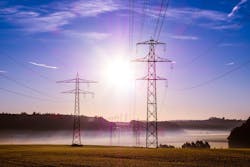California’s new power grid modernization plan furthers ambitious climate goals
California’s new $7.3 billion grid modernization plan is a crucial step in furthering its ambitious climate goals.
The board of governors for the California Independent System Operator (CAISO), the state’s grid operator, recently approved a strategy to build thousands of miles of new high-voltage transmission lines. This step addresses a key challenge towards decarbonizing energy consumption: providing enough transmission to connect a massive amount of new clean energy sources to the grid.
Beefing up transmission capability is essential to meeting California’s goal of a carbon-free energy sector by 2045. What’s more, expanded grid capacity could result in lower electric bills for customers if the cost of clean energy generation technology continues to drop.
As more jurisdictions adopt building codes that ban natural gas hookups, and encourage adoption of heat pumps and EV chargers, the environmental benefits of such regulations depend on sourcing clean energy. A more robust grid that can assimilate new solar and wind farms makes this possible.
